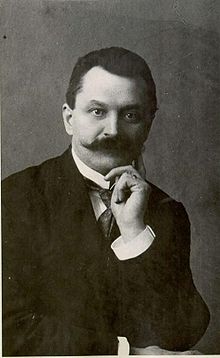Matija Murko
This article needs additional citations for verification. (January 2013) |

Matija Murko, also known as Mathias Murko (10 February 1861 – 11 February 1952), was a Slovenian scholar, known mostly for his work on oral epic traditions in Serbian, Bosnian and Croatian.
Life
Murko was born in the small village of
Murko had an intense social life and was a personal friend of figures as

Work and influence
Murko was trained in the
Since Murko published mostly in German and French, his work was little known to scholars unfamiliar with these languages, but it had an important influence on Milman Parry, who was studying for his doctorate at the Sorbonne in Paris under Antoine Meillet, at the time when Murko's major work appeared in French.
His work was praised by the renowned Austrian critic Hermann Bahr, who regarded it as one of the finest examples of style in contemporary scientific prose.[2] Murko also influenced the development of modern Slovenian literary history, especially Fran Ilešič, Ivan Prijatelj, and France Kidrič.
Sources
- Slovenska matica, 1894).
- Deutsche Einflüsse auf die Anfänge der Slavischen Romantik ("German Influences on Slavic Romanticism", Graz, 1897).
- Die südslavischen Literaturen: die Kultur der Gegenwart ("The South Slavic Literatures: the Culture of the Present", Stuttgart, 1908).
- Geschichte der ältern slawischen Literaturen ("History of Ancient Slavic Literatures", Leipzig, 1908).
- Die Bedeutung der Reformation und Gegenreformation für das geistlige Leben der Südslaven ("The Importance of the Counter-reformation in the Spiritual History of South Slavs", Prague: Slavia, 1925; Heidelberg, 1926).
- La poésie populaire épique en Yougoslavie au début du XXe siècle ("The Folk Epic Poetry in Yugoslavia at the Beginning of the 20th Century", Paris: Champion, 1929)
- Tragom srpskohrvatske epike ("Tracing the Serbo-Croatian Epic Literature", Zagreb, 1951).
- Izbrano delo ("Selected Works", edited by Anton Slodnjak, Ljubljana, 1962).
References
Sources
- Lord, Albert Bates (1960), The Singer of Tales, Cambridge, MA: Harvard University Press, pp. 11–12.
- ISBN 0-393-05788-7, pp. 186–187.
- Janko Kos et al. (1982), written at Ljubljana, Slovenska književnost, Cankarjeva založba, pp. 239–240.
